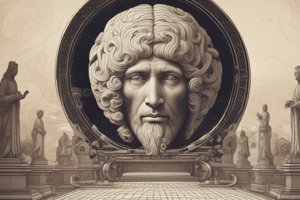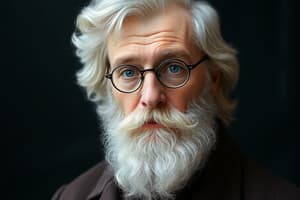Podcast
Questions and Answers
What is George Berkeley's theory of immaterialism?
What is George Berkeley's theory of immaterialism?
- The theory that everything in the world is a combination of matter and ideas
- The theory that everything in the world is made up of ideas perceived by the mind (correct)
- The theory that everything in the world is a figment of our imagination
- The theory that everything in the world is made up of matter
What is Berkeley's view on reality?
What is Berkeley's view on reality?
- Reality is a combination of material substance and immaterial minds
- Reality is constructed entirely of immaterial, conscious minds and their ideas (correct)
- Reality is an illusion created by our minds
- Reality is constructed entirely of material substance
What did Berkeley argue against in his Essay Towards a New Theory of Vision?
What did Berkeley argue against in his Essay Towards a New Theory of Vision?
- The existence of light and colour
- The limitations of human vision
- The importance of language
- The existence of material objects (correct)
What did Berkeley argue against in De Motu (On Motion)?
What did Berkeley argue against in De Motu (On Motion)?
What did Berkeley argue about forces and gravity as defined by Newton?
What did Berkeley argue about forces and gravity as defined by Newton?
What is Berkeley's razor?
What is Berkeley's razor?
What is Berkeley's view on primary and secondary qualities?
What is Berkeley's view on primary and secondary qualities?
What is the significance of Berkeley's work in the 20th century?
What is the significance of Berkeley's work in the 20th century?
What is Berkeley's view on the existence of matter?
What is Berkeley's view on the existence of matter?
Study Notes
George Berkeley: Philosopher, Bishop, and Advocate of Immaterialism
-
George Berkeley was an Anglo-Irish philosopher and bishop, known for his theory of "immaterialism," which denies the existence of material substance and instead contends that familiar objects like tables and chairs are ideas perceived by the mind and, as a result, cannot exist without being perceived.
-
In 1709, Berkeley published An Essay Towards a New Theory of Vision, in which he discussed the limitations of human vision and advanced the theory that the proper objects of sight are not material objects, but light and colour.
-
His chief philosophical work, A Treatise Concerning the Principles of Human Knowledge, in 1710, advanced his theory that nothing exists outside the mind.
-
Berkeley argued against Isaac Newton's doctrine of absolute space, time and motion in De Motu (On Motion), published 1721, which was a precursor to the views of Ernst Mach and Albert Einstein.
-
He published Alciphron, a Christian apologetic against the free-thinkers, in 1732, and The Analyst, a critique of the foundations of calculus, in 1734, which was influential in the development of mathematics.
-
Berkeley's work gained interest after World War II because he tackled many of the issues of paramount interest to philosophy in the 20th century, such as the problems of perception, the difference between primary and secondary qualities, and the importance of language.
-
Berkeley was born in County Kilkenny, Ireland, in 1685, and attended Trinity College Dublin, where he was elected a Scholar in 1702.
-
His earliest publication was on mathematics, but his essay An Essay Towards a New Theory of Vision raised much controversy and is now an established part of the theory of optics.
-
Berkeley visited England and was received into the circle of Addison, Pope and Steele, and he also travelled extensively in Europe between 1714 and 1720.
-
He was the Bishop of Cloyne in the Church of Ireland from 1734 until his death in 1753, and he was also involved in humanitarian work, including efforts to create a home for abandoned children.
-
Berkeley's last two publications were Siris: A Chain of Philosophical Reflexions and Inquiries Concerning the Virtues of Tarwater, And divers other Subjects connected together and arising one from another (1744) and Further Thoughts on Tar-water (1752).
-
His philosophy was centred on the concepts of "spirit" and "idea," and he believed that God was present as an immediate cause of all our experiences.
-
Berkeley's relativity arguments refuted John Locke's belief on primary and secondary qualities because Berkeley believed that perception is dependent on the distance between the observer and the object, and thus, we cannot conceive of mechanist material bodies that are independent.Summary Title: George Berkeley's Philosophy
-
George Berkeley was a philosopher who believed that reality is constructed entirely of immaterial, conscious minds and their ideas, and everything that exists is somehow dependent on the subject perceiving it, except the subject themselves.
-
Berkeley refuted the existence of abstract objects and argued that only the minds' perceptions and the Spirit that perceives are what exists in reality.
-
Berkeley believed that both primary and secondary qualities are mind-dependent and cannot exist without our minds.
-
In his Essay Towards a New Theory of Vision, Berkeley argued against the classical scholars of optics, holding that spatial depth is itself invisible and that visual cues can only be used to indirectly judge distance.
-
Berkeley argued that forces and gravity, as defined by Newton, constituted "occult qualities" that "expressed nothing distinctly", and forces lay beyond any kind of empirical observation and could not be a part of proper science.
-
Berkeley's razor is a rule of reasoning proposed by the philosopher Karl Popper that represents an extreme, empiricist view of scientific observation that states that the scientific method provides us with no true insight into the nature of the world.
-
Berkeley regarded his criticism of calculus as part of his broader campaign against the religious implications of Newtonian mechanics – as a defence of traditional Christianity against deism.
-
The tract A Discourse on Passive Obedience (1712) is considered Berkeley's major contribution to moral and political philosophy, where he defends the thesis that people have "a moral duty to observe the negative precepts (prohibitions) of the law, including the duty not to resist the execution of punishment."George Berkeley: Philosopher, Bishop and Idealist
-
George Berkeley believed that laws of nature are derived from God.
-
Passive Obedience is a kind of 'Theological Utilitarianism,' according to Berkeley.
-
Berkeley believed that matter does not exist and that only ideas exist.
-
Berkeley's theory relied heavily on his form of empiricism, which relies on the senses.
-
Berkeley attempted to prove the existence of God throughout his beliefs in immaterialism.
-
Berkeley influenced many modern philosophers, especially David Hume.
-
Berkeley's philosophical ideas were comparatively uninfluential during his lifetime.
-
Berkeley's Treatise Concerning the Principles of Human Knowledge was published three years before the publication of Arthur Collier's Clavis Universalis, which made assertions similar to those of Berkeley's.
-
Berkeley is considered one of the originators of British empiricism.
-
Both the University of California, Berkeley, and the city of Berkeley, California, were named after him.
-
Berkeley Preparatory School in Tampa, Florida, is also named for him.
-
Bishop Berkeley's Gold Medals are two awards given annually at Trinity College Dublin.
Studying That Suits You
Use AI to generate personalized quizzes and flashcards to suit your learning preferences.
Description
Take this quiz to test your knowledge about the life and philosophical ideas of George Berkeley, an Anglo-Irish philosopher, bishop, and advocate of immaterialism. Learn about his theories of perception, the non-existence of material substance, and his criticism of Isaac Newton's doctrines. Explore his views on morality and politics, and discover how his ideas influenced modern philosophy. Test your understanding of his contributions to mathematics, optics, and theology. See how much you know about this important figure in the history of




